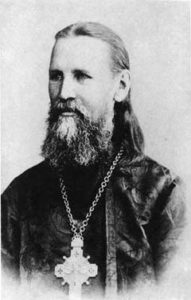SSCORRE!
Saint Sophia Cathedral
Online Resources for our Religious Edification

Topic of the Week – “Why is it, you ask, that one can pray for so many years with a prayer book, and still not have prayer in his heart?
I think the reason is that people only spend a little time lifting themselves up to God when they complete their prayer rule, and in other times, they do not remember God.
For example, they finish their morning prayers and think that their relation to God is fulfilled by them; then the whole day passes in work, and such a person does not attend to God. Then in the evening the thought returns to him that he must quickly stand at prayer and complete his evening rule. In this case, it happens that even if the Lord grants a person spiritual feelings at the time of the morning prayer, the bustle and business of the day drowns them out.
As a result, it happens that one does not often feel like praying, and cannot get control of himself even to soften his heart a little bit. In such an atmosphere, prayer develops and ripens poorly. This problem (is it not ubiquitous?) needs to be corrected, that is, one must ensure that the soul does not only make petition to God when standing in prayer, but during the whole day, as much as possible, one must unceasingly ascend to Him and remain with Him….“
Read the entire homily Saint Theophan the Recluse on Prayer, Homily 2
Adult/Family/High School:
Prayer as a Means to Make Christ the Center of Our Life at All Times
“The Church gives us three forms of prayer: Say your prayers, go to church, and don’t forget God. The first one, “Go to church,” liturgical, that’s the communal worship that we do in church. The second one is the personal time where we have our own personal prayer time, morning and evening. The third time is the rest of the day: “Never forget God.”
…The third time: what about all the rest of your 24 hours? That’s the part that gets interesting. That’s the part that we don’t talk much about, but in the monastery, that’s what we do. We try to turn our entire life into prayer. So prayer gets taken out of the realm of being a task, being a thing to do that I have to set time aside for, and it becomes a way of life. This [is] where we really have a chance to walk with Jesus, and we have various things that we’re taught in the monastic life that are simple exercises, but they really work. By doing those, we develop that sense of holiness, the sense of the presence of life in our lives, so all of our acts and words can have that….
…This is where your homework comes in. Everybody, got your journals open? Because I’m going to give you homework. This is homework that’s not going to be another task, is not going to take any time. You’ll see what I mean. I’m making you a promise. You’re not going to have ten things to do “and I have to do my homework.” No, it’s not that kind of thing at all. The rules are that you have to pick—I’m going to give you three things—you have to pick one.…
What I’m going to do is to encourage you to pick one of these things and to say, “For the next year, this is going to be my spiritual exercise. I’m going to commit myself to doing this, going to put some heart in it, [and] ask the Lord to help me with which one I pick.” Then at the end of the year, you can pick another one, because by the time that year is over—this is the guarantee—that, if you’ve really given yourself to that exercise, it’s going to be so much a part of you you’re simply not going to stop doing it. You’re going to feel that Christ is closer to you, that you have more of a sense of his presence in your life. That’s what these things are aimed for. That’s the purpose, the goal of these things….
“The first one is to ask Christ to bless everything that we do. So every time that you start a task, no matter what it is, you say, “Lord, bless me.” If you are in a situation in which you can make the sign of the Cross, you make the sign of the Cross. It’s that simple. Now, that doesn’t take any time. You can make the sign of the Cross while you’re going to get the vacuum cleaner. Whatever little prayer you want—“Christ, have mercy on me. Bless me to do this.”—that’s what you do. Sometimes what this enables, this particular exercise helps us to bring Christ into every aspect of our life, no matter what it is.
We know we want him in the big. If I’m going to decide: “Do I want to marry this man? Do I want to change jobs? Do I want to buy this new house?” Those things, we’re kind of used to asking Christ to help us with, but “Do I want peanut butter or tuna fish for lunch today?” Fr. Roman, one of our spiritual fathers, he says, “If you’re making a sandwich, have Christ next to you.” All the little things that we do, whether we’re sitting with a friend, whether we’re playing a computer game… It’s very interesting, for instance, if you’re playing a computer game, and you don’t want to ask Christ to bless you… well, that’s something good to pay attention to. Maybe it’s not an appropriate time for me to be doing this.
By doing this, we make our lives into a home for God. We acknowledge that all we have comes from him, and that his involvement in our life makes a difference to us. This is from Mother Catherine, [who] was a nun in England; she passed away. She says, “The smallest detail in life we can turn into a present for God, over which he rejoices, and in his joy makes it great.” In other words, we can welcome the smallest event exclusively as from his hands, receive it as a token of his tender love for us, and use it for him. That’s the point of this – asking Jesus – to bless everything that we do…
To read the entire transcript of this interview with Mother Magdalena of Holy Transfiguration Monastery in Ellwood City, PA go to
Preschool/Middle School/Elementary:“…In order to begin this task, one must first, during the course of the day, cry out to God more often, even if only with a few words, according to need and the work of the day.
- Beginning anything, for example, say ‘Bless, O Lord!’
- When you finish something, say, ‘Glory to Thee, O Lord’, and not only with your lips, but with feeling in your heart.
- If passions arise, say, ‘Save me, O Lord, I am perishing.’
- If the darkness of disturbing thoughts comes up, cry out: ‘Lead my soul out of prison.’
- If dishonest deeds present themselves and sin leads you to them, pray, ‘Set me, O Lord, in the way’, or ‘Do not give up my feet to stumbling.’
- If sin takes hold of you and leads you to despair, cry out with the voice of the publican, ‘God, be merciful to me, a sinner.’
Do this in every circumstance, or simply say often, ‘Lord, have mercy’, ‘Most Holy Theotokos save us”, ‘Holy Angel, my guardian, protect me’, or other such words.Say such prayers as often as possible, always making the effort for them come from your heart, as if squeezed out of it. When we do this, we will frequently ascend to God in our hearts, making frequent petitions and prayers. Such increased frequency will bring about the habit of mental conversation with God.”Excerpted from Saint Theophan the Recluse on Prayer, Homily 2
A Message from Maria Spanos
I am passionate about our Orthodox Christian faith and seek to help others learn as much as they can about it. My purpose here is to share online resources that help strengthen our relationship with Christ and bind us closer to His Church. I believe they are invaluable in learning about our precious Orthodox Tradition, and are a great aid for teaching family members, friends and others about Orthodoxy. ~Maria
Two of my favorite quotes:
 “A true Christian behaves in this life so that it may be a preparation for the future one and not only a life here below. In his actions, he does not think what will be said of him here but of what will be said there in heaven; he represents to himself that he is always in the presence of God, of the angels and all the saints, and remembers that someday they will bear witness of his thoughts, words, and deeds.” — Saint John of Kronstadt
“A true Christian behaves in this life so that it may be a preparation for the future one and not only a life here below. In his actions, he does not think what will be said of him here but of what will be said there in heaven; he represents to himself that he is always in the presence of God, of the angels and all the saints, and remembers that someday they will bear witness of his thoughts, words, and deeds.” — Saint John of Kronstadt
__________________________________________________________

“Of all the holy works, the education of children is the most holy.”
— St. Theophan the Recluse






